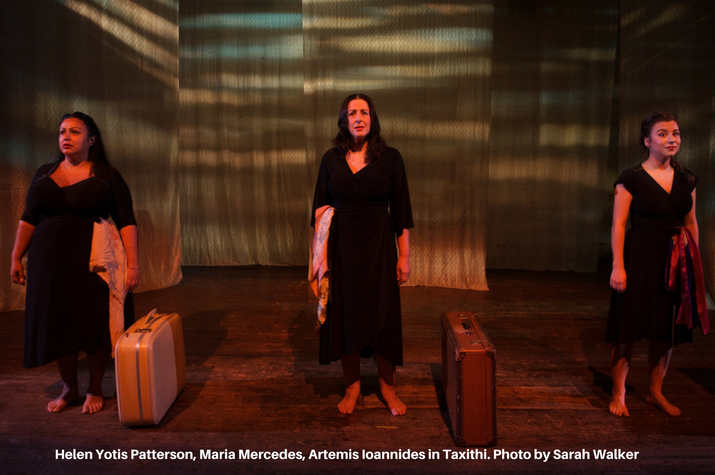Kalo Taxithi – charting the journey to cultural diversity

An Australian play exploring the experience of female Greek immigrants has resonated with audiences of all backgrounds. MEAA Equity member Maria Mercedes, who plays one of the women, explains why she believes the work has universal appeal.
The conversation about cultural diversity in the Australian arts and lack of work opportunities for various ethnic groups is an important, complex and frustrating one. But there are Australian writers, performers, film, TV and theatre makers who are not buying into the status quo, who are being proactive, forging a successful path and creating some brilliant work, which is close to their ethnicity and cultural DNA. Their work doesn't exclude general theatregoers but invites a broad spectrum of audience diversity. It’s not only entertaining but also informative of the historical fabric of our country.
One example is the play Taxithi – An Australian Odyssey by Helen Yotis Patterson, who also stars in the production, alongside Artemis Ionnides and yours truly, with direction by Petra Kalive. Since its debut season early this year at Melbourne’s 45 Downstairs, Taxithi – the word means ‘journey’ in Greek – has captivated critics and audiences alike, playing two sold-out seasons to more than four and a half thousand people.
The play is essentially about three Greek women of the 1950s, ’60s and ’70s migrating to Australia. The 90 minutes of monologues are tied together from their experiences, driven with Greek music and songs of the corresponding eras. Musical direction is by Andrew Patterson on piano, with Jacob Papadopoulos on bouzouki.
The stories are all true, collected by Yotis Patterson via interviews she conducted with her Greek family and friends. They range from funny and poignant to tragic, heartbreaking, brave and triumphant.
The set is minimal, consisting of three chairs, three draped lace curtains and the projection of old photographs – simple yet beautiful. There is nothing to distract from the stories and performances. One of my favourites is the story of the thousands of brides who were sent to Australia to marry strangers. Hundreds of photographs of them are projected, leaving an indelible impact on audiences.
I decided to do Taxithi because it spoke to me on a profound level. I felt it was time to pay tribute not only to my parents but also to all the brave souls who, under extraordinary circumstances, migrated to Australia.
It was a collaborative process and proudly all female. The experience proved to be very cathartic... At times, I felt I was an ancestral conduit – for example, I wear the actual scarf my grandmother gave to my mother the day she departed for Australia on board the Tasmania in 1955.
Singing in Greek was also a huge challenge, as it’s a style I had little experience with. But memories of my late father George Moutsidis playing his Greek records came rushing back and it didn’t take long to grasp the unique style.
To have my mother Dionisia in the audience, reliving her experiences, seeing her photograph as a young newcomer to Australia projected on the backdrop, was overwhelming.
My career and work suddenly took on more importance and honesty than anything I had ever done. For once, I didn’t have to try to fit in or pretend to be anything other than who I am.
There have been some, shall I say, funny moments. One night, I thought Taxithi was going to end up an unfortunate comedy. I was experiencing a bad food reaction, with no idea what had caused it and not knowing whether I’d get through the show. As we were about to walk on stage, I had an epiphany, exclaiming: “It’s the sauerkraut!” It had been in and out of my bag all week, during the hottest weather, and unfortunately I’d had it for dinner. We burst into hysterics and it was a miracle we managed to perform without falling into a laughing heap.
Audiences of all generations and nationalities identify with Taxithi on a personal level. The play’s success is due to the universal story at its core – of people leaving their homeland for a better, safer, happier life. It’s a reflection of what is happening in the world today – it’s very relevant, resonating loudly and deeply – but, essentially, the stories are Australian.
So don’t wait for permission to have cultural diversity in the arts – just get out there and create it. An audience awaits.
MARIA MERCEDES IS ONE OF AUSTRALIA’S MOST SUCCESSFUL AND ENDURING MUSIC-THEATRE PERFORMERS. SHE HAS ALSO STARRED AS A DRAMATIC AND COMEDIC ACTRESS IN BOTH TELEVISION AND FILMS